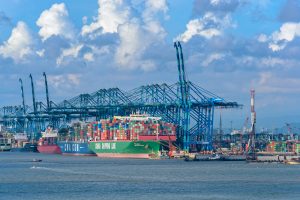Malaysia has banned all Israeli-flagged cargo ships from docking at its ports in what it described as a response to Israel’s “cruel” assault on the Gaza Strip.
The ban, announced in a statement yesterday by Prime Minister Anwar Ibrahim, singles out ZIM Integrated Shipping Services Ltd., Israel’s largest shipping company, which Malaysia has allowed to dock in the country since 2002, the statement said.
“The Malaysian government has decided to block Israel-based shipping company ZIM from anchoring in any Malaysian port,” Anwar said, adding that the Ministry of Transport “will take immediate action by imposing a permanent ban on this company with immediate effect.” According to a report by BenarNews, the ban will also apply to a ZIM ship scheduled to arrive at Port Klang on December 26.
In addition to the ban on ZIM ships, Anwar added that his government “has also decided to no longer accept ships flying the Israeli flag to dock in the country” and will impose a ban on “any ship that is heading to Israel from loading cargo at Malaysian ports.”
Anwar said that the sanctions were “a response to Israel’s actions that disregard the basic humanitarian principles and violate international law through the ongoing massacre and continuous cruelty against the Palestinian people.” Israel’s offensive in Gaza, a response to brutal attacks by Hamas militants into southern Israel on October 7, has reportedly killed an estimated 20,000 people, prompting a global chorus of outrage, particularly in the Muslim world.
Malaysia’s government has been an especially prominent member of this chorus, expressing vocal support for the Palestinian cause since the outbreak of the current conflict. Speaking at a large pro-Palestine rally in Kuala Lumpur on October 24, Anwar described the ruthless Israeli response, which has involved air attacks and now a ground operation in Gaza, as “the height of barbarism in this world,” and called on Israel to end its occupation of Palestinian territories.
Support for the Palestinian cause is a subject of bipartisan consensus in Malaysia, which has not only refused to establish diplomatic relations with Israel but has also maintained close relations with Hamas. In mid-October, Anwar went so far as to hold a call with Ismail Haniyeh, the head of Hamas’ political bureau, during which he expressed Malaysia’s unwavering support for the Palestinian people. Anwar has refused to cut his country’s long-standing ties with Hamas, despite claiming to have come under U.S. pressure to do so.
“Malaysia will not change its stance, particularly our reluctance to consider Hamas as a terrorist group,” Anwar told Parliament last month. He pledged that his government would maintain “its independent position.”
Malaysia’s ban comes at a time of major disruptions to shipping routes, with Yemen’s Houthi rebels launching attacks on international shipping in the Red Sea passage.
































